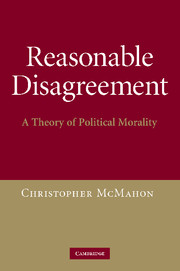Introduction
Published online by Cambridge University Press: 11 September 2009
Summary
Talk of reasonable disagreement is a staple of political discourse. We often hear that a political issue admits of reasonable disagreement or is one about which reasonable people can disagree. But there has been little philosophical discussion of reasonable disagreement, and it is not clear how the phenomenon is to be understood. Wherever we find political disagreement, the parties will typically be prepared to offer reasons for the positions they take. The different positions will, in this sense, be reasoned. But to assert that disagreement in a particular case is reasonable is to do more than acknowledge that the parties have reasons for the positions they take. It is to imply that at least two of the opposing positions could be supported by reasoning that is fully competent.
In many contexts, competent reasoning within a group can be expected to produce a convergence of opinion. When the exchange of arguments is carried out in good faith, it eliminates mistakes in reasoning, and we usually suppose that if everyone's reasoning has been purged of mistakes, there will be agreement. To offer and receive arguments in good faith is to respond only to the force of reason, ignoring the possibility that the options being considered will impinge positively or negatively on one's personal interests or the interests of a group with which one is affiliated.
- Type
- Chapter
- Information
- Reasonable DisagreementA Theory of Political Morality, pp. 1 - 6Publisher: Cambridge University PressPrint publication year: 2009



